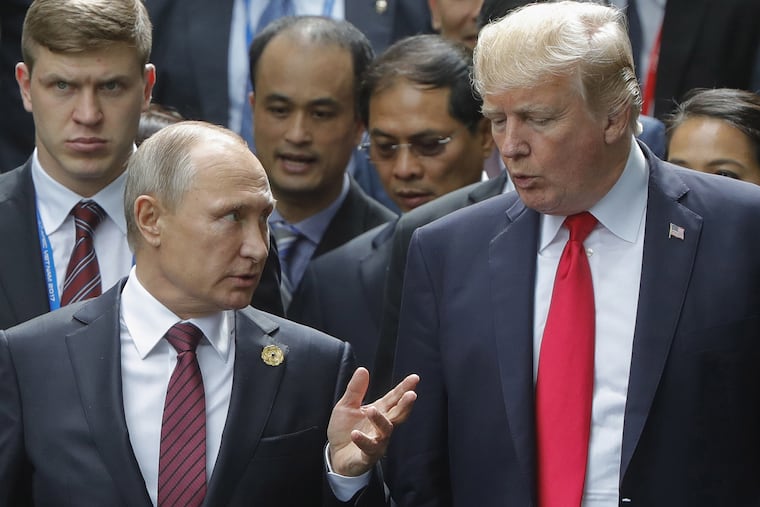NATO allies fear Trump will kick them, hug Putin | Trudy Rubin
European allies worry Trump will slam them and undercut the alliance at NATO summit June 12, then embrace Putin in Helsinki on June 16.

The reasons why patriotic Americans should worry about the president's two upcoming summits — with NATO leaders and then with Vladimir Putin — were on full view last week.
The day after July 4 – a celebration of the founding fathers' rejection of despots — Trump again praised Russian strongman Vladimir Putin. Scorning critics' concerns about the Putin summit, Trump proclaimed at a Montana rally: "Those critics say 'President Putin is KGB.' You know what? Putin's fine."
But when it came to our democratic allies in Europe, the president couldn't have been more scornful: "They kill us on trade. They kill us on other things. They kill us with NATO. We are the shmucks paying for the whole thing."
In other words, our relationships with our oldest allies are based only on money, not on shared democratic values. And the allies are nothing but cheats.
>> READ MORE: Trump gets his summit with Putin. Watch out! | Trudy Rubin
Yet even as he denigrates our friends, Trump lines up with Moscow on issues that top the NATO agenda, including Ukraine, Syria and Russian hacking. Is the president really ready to align himself with Putin against democratic Europe? Here are three signs to watch for that will make his preferences clear.
First: Will Trump use the July 12 NATO summit mainly to harangue alliance members about inadequate defense spending rather than focus on new security challenges from Russia and elsewhere? If Trump disses NATO just before his July 16 meeting with Putin, or talks of pulling U.S. troops out of Europe, this will be a huge gift to the Russian leader, who wants to see NATO crumble.
Indeed, European leaders fear the NATO summit will be a miserable rerun of last month's G-7 summit . There, Trump insulted Canada's Justin Trudeau and Germany's Angela Merkel, but urged that Putin be re-invited to the group – from which he was expelled for seizing Crimea.
In a wholesale reversal of GOP policy since WWII, Trump seems as eager as Putin to encourage divisions within democratic Europe. The president has denounced the European Union as "set up to take advantage of the United States" and has declared that "NATO is as bad as NAFTA." For his part, Putin has funded anti-EU and anti-NATO political candidates and parties across Europe and used cyberwarfare to support them. (Trump has praised some of those same nationalist-populist candidates.)
>> READ MORE: Trump pummels G-7 democratic allies but loves Russia, China | Trudy Rubin
The president appears to share Putin's view that the world should be dominated by a few strongmen who lead the world's major powers. This is a theme I've heard repeatedly from Russian foreign-policy experts.
"The club of powerful countries won't look like the G-7 in the future," says Fyodor Lukyanov, editor-in-chief of the Moscow journal Russia in Global Affairs. "A configuration of big world powers will emerge in years to come, China, the United States, Russia, India maybe. There are a lot of questions about what will happen with Europe, will it be united or separate." But Lukyanov added, "The collective West won't survive in the same fashion."
At the NATO summit, we'll see whether Trump will work to strengthen the "collective West" – or even grasps its importance. Or whether he prefers to hasten its demise in favor of a Big Boys club he thinks he can dominate.
The second sign to watch: will Trump accept Putin's annexation of Crimea and his continued military meddling in eastern Ukraine? This issue greatly concerns our NATO partners because the Russian leader's annexation of Crimea in 2014 marks the first time Europe's boundaries have been changed by force since World War II.
>> READ MORE: Trump is suffering from a bad case of autocrat envy | Trudy Rubin
When recently asked whether he would accept the Russian position on Crimea, Trump said vaguely: "We're going to have to see." At the G-7, he reportedly told participants that Crimea was Russian because the population spoke Russian. By that standard, Russia could annex huge chunks of Latvia, Kazakhstan, Belarus, the Caucusus, or even Berlin, which all have large Russian-speaking populations.
Trump can't unilaterally lift congressional – or European – sanctions on Russia over Crimea. But he can undermine the firm NATO stance on the issue by signaling he is ready to accept the annexation as well as effective Russian control of eastern Ukraine.
The third sign: how Trump deals at the summits with the issue of Putin's meddling in Western elections. European leaders have pushed back against Kremlin cyber intrusions and want to see Trump do more.
Yet the president persistently parrots Putin's denials of any meddling in the 2016 presidential election. "Every time [Putin] sees me he says, `I didn't do that.' I think he is very insulted by it," Trump said last year – and he repeated Putin's disclaimer just a few days ago.
> READ MORE: Trump thinks his personal relationships with dictators will save the world. He's wrong | Trudy Rubin
So the two summits are a test. If the president hews to the Kremlin line on Ukraine and on Russian hacking, he will be helping Moscow undermine the NATO alliance. We'll soon see whether Trump intends to become Putin's willing accomplice in dismantling the "collective West."